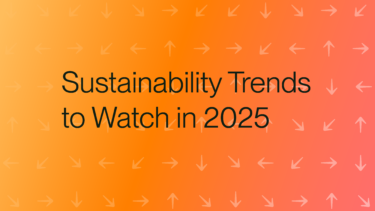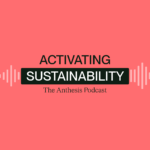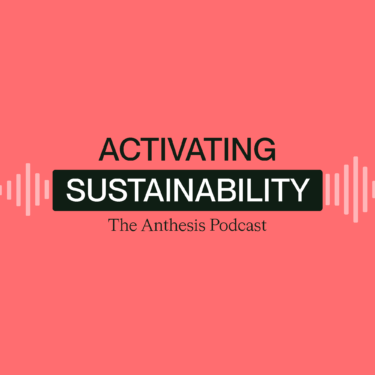
Speakers
Kirsten Doddy – Chief Marketing Officer, Anthesis
Freya Williams – Chief Strategy Officer, Revolt part of Anthesis, North America
Honor Cowen – Global Retail and Apparel Sector Lead, Anthesis
Related Topics
- ‘Poking The Bear’ report from Revolt Part of Anthesis
- ‘Causes that Count’ from Revolt Part of Anthesis
- Sustainability Trends to Watch in 2025
Share this episode
In this JUST IN episode of our Activating Sustainability series, our guest host Kirsten Doddy is joined by Freya Williams and Honor Cowen to discuss the themes, emerging topics, and actions from GreenBiz25 which took place 10-12 February in Pheonix Arizona, USA.

Read the transcript
Kirsten Doddy: Hi, and welcome to Activating Sustainability, the Anthesis podcast. I’m your guest host, Kirsten Doddy, Anthesis’ Chief Marketing Officer. Last week, myself and a number of Anthesians, plus more than 2,000 sustainability professionals attended GreenBiz in Phoenix, Arizona. GreenBiz is one of the largest sustainability conferences globally.
On today’s JUST IN episode, I’m pleased to be speaking with Freya Williams, our Chief Strategy Officer with Revolt North America, which is part of Anthesis, and also Honor Cowen, our Global Retail and Apparel Sector Lead. They will both be generously sharing their key insights, takeaways, and actions from this year’s event with you.
Freya and Honor, welcome to the podcast. Thanks for joining me.
Freya Williams: Thanks for having us.
Kirsten Doddy: So let’s take ourselves back to GreenBiz and reflect on what we experienced and share during those three days. Given all the changes we’re seeing from the effects of climate change to increased regulations in Europe and California, the geopolitical landscape and the backlash to ESG and the pullback of DEI targets and more, how would you describe the vibe of the conference and what we’re hearing from our clients?
Let’s start with you, Honor.
Honor Cowen: Thanks, Kirsten. Yeah, this was actually my first time at GreenBiz. The previous attempt in 2023 was thwarted by COVID. But so, I felt extremely lucky and grateful to have gone to this year’s event, especially given this moment in time and the next four years that we have together, particularly in North America.
It was extremely energizing to see some of my clients that I don’t always get to see that often in person. Shout out to Target, who I’ve been working with for eight years at this point, and got to meet a good bunch of the team. Also, some new clients that I was meeting for the first time, always delightful to put faces to names and I also had the opportunity to join some of the round tables, the breakout sessions, the keynote speakers. It was actually incredibly inspiring and uplifting overall certainly came out feeling more positive than I came into the experience, into GreenBiz. Just having the opportunity to hear from the leaders in the space and understand how well we can be tackling what we’re up against. So I really enjoyed it. It felt like a bit of a kind of wolf call or a bat signal, like call to action, across the board, across sectors, across corporate clients and the industry bodies as well.
And then we had also had the client dinner, which on Tuesday, which was really lovely to sit down and have some really insightful conversations, a renewed emphasis on collaboration, of course, as well. We had literally competing clients sitting down next to each other at tables. And I think that is a really important thing to do.
Kirsten Doddy: Fantastic. And Freya?
Freya Williams: Unlike Honor, it actually was not my first GreenBiz. I’ve been going to GreenBiz for many years now. And it’s always that kind of, these big events were as a bit of a bellwether, a state of the nation on the industry, the sustainability profession, where we’re at, where our clients are at.
When I started going to GreenBiz, probably over a decade ago, it was not the scale of event it is now. It was, there are some of us who’ve been there that whole time. We’re the stalwart. Somebody was calling us the OGs, which made me giggle. But for me, what is really great about this year was, if we’re taking this as a bellwether, I definitely was unsure as to whether the turnout would be at the level it has been historically, whether we would have that senior leadership showing up. And we need not have worried on either front, as you’ve articulated, Kirsten.
I think we were close to 3,000 attendees. I did not see any client attrition from my clients. There were a large cohort of Chief Sustainability Officers present, showing up on stage, speaking out sharing progress. And there was a general feeling of, yeah, the context has shifted. This is no doubt a challenging moment.
But while we might need to rethink how we’re approaching it, I did not hear a single person say that they are planning to slow down the actions that they’re taking. Nobody is saying, admitting defeat or raising the white flag, absolutely to a person. The attendees were really still committed to progress.
They’ve seen a lot of progress. They’re able to point now after, some of them, 10, 20 years in these kinds of roles, really point to the progress they’ve been able to achieve. What I did hear is that the ways that we’re talking about sustainability are going to evolve. And this of course is something that we at Revolt have been speaking about for the last 18 months with our Poking the Bear research.
The ways we talk about sustainability will need to change. I had much stronger focus this year on business value creation. We can come back to that theme in a minute and on messaging that unifies, unites, but maybe is also a little Trojan horse for how we continue to move forward. But overall, it was a week of reconnection of much-needed community for people to hear how others are planning to maybe adapt to just evolve. Their approach is going forward but I came away super encouraged these events can really give you that kind of shot in the arm that keep you going, that keep you motivated and inspired. And as Honor said, it was also just wonderful to see so many of the clients in person and spend a little time and have a little kind of sidebar coffee, tea, cocktail, whatever it would be.
So it was a really inspiring and interesting week. And I think as a bellwether, as I said, for the industry Something that left me feeling confident. And so this is a really resilient group of people who are committed and dedicated to continuing the work.
Kirsten Doddy: Fantastic. Yeah, I totally agree. I think the feeling of collaboration, the feeling of how we communicate, which we’ll come on to in a little while, and just thinking about the cohorts and how people work together, that was really interesting insights that were going through the two days. So if we think about those two days, there were, as well as all the collaboration and events, there was a huge conference agenda that was put in play.
There was more than 80 sessions that were held, including a couple from Anthesis as well. So, you all have attended different sessions. What were the key insights that excited you most that you’d like to share?
Honor Cowen: Yeah, I wish I could have spread myself in 80 different directions because there was so much juicy content. The keynote speakers were inspiring, certainly, and actually quite a few of them focused on kind of personal stories and the ways that we can show up and take inspiration and things like grief or also to inspire and activate our work in this space as practitioners.
But some of the takeaways to touch on it, the use of language is gonna be key here and how we reframe sustainability. And ESG in particular. A lot of us are technical experts, we’re practitioners, we’re scientists and there needs to be a evolution of the language there to the business value creation, to supply chain resilience, to cost efficiency, to risk mitigation, to really embed into the business language of the corporates that we’re talking to.
Another um, insight, and actually, our very own Erin McVeigh was on stage talking about data-driven decision-making, building a unified view of our supply chain. The resilience of our supply chain, how we are sourcing, the transparency ̶ this is a topic that’s been around for a long time, but it’s absolutely still front and center of how to transform these supply chains and future proof them to ensure that we’re getting the product and new product innovation also onto the shelves at the same time. So AI, of course, was on a lot of tips of tongues, I felt like, how we can use those machine learning models to underpin all of the decisions that we need to be making from a scientific point of view with the evidence base.
The quantitative metrics to add into the business case and then the business value that we need for all of the initiatives, roadmaps, implementation plans that are already in transit. Yeah, Freya. I’ll hand over to you.
Freya Williams: Yeah, great. Thank you, Honor. We’ll probably touch on some similar themes, I’m sure. So in case listeners are not as familiar with Revolt, we sit within the brand and comms vertical to Anthesis. We work with a lot of brands on I say we like to help companies brand, their sustainability initiatives and embed sustainability into their brands.
And so I was definitely listening to the communications track. That was a big feature of this year. And on day one, there was a half-day session called ‘What Do We Say Now?’ that was a number of practitioners and researchers talking about exactly what you raised Honor, what is the new language for sustainability and impact that we need to be embracing now.
And the first speaker presented some really provocative findings around it. They’re very much aligned with our Poking the Bear research. And one of the things he shared, which Honor sort of was referring to before, is that, one of the places we have gone wrong and I firmly am an advocate for this is allowing acronyms to define our space. The DEI, the ESG, the CSRD, the CESW, no one knows what the hell we’re talking about and the way he punctuated that was to say there’s a good number of Americans who believe that ESG stands for eggs sausage and grits. The call to arms here is we need to create new language that connects with people that helps align the work that we do to people’s values and priorities.
We can so fall into the trap of being in our own little bubble where we’re just talking to one another. But we’re not going to drive, we’re not going to win the communications war with messaging that doesn’t land. And we are being in some ways out communicated by folks ̶ mostly folks with bad intent, but also some with good intent. That was a really, big theme is how do we really think about the language, the framing that is going to resonate with broader audiences and really bring more people along with us, especially in an environment that might be trying to shut that down.
And the first speaker on that day made a great point that again, really corroborates our sort of Poking the Bear philosophy that, we need to be thinking less about morality, people being, feeling that they’re being sold an ideology or that the people in the sustainability world somehow think they’re right and everybody else is wrong.
How appealing is that as a message, when you feel like you’re being told off or schoolmarmed or lectured. So what we see in our research is that you want to align with people’s values, family, belonging, freedom, the things that people hold the most dear. Let’s show how our topics ladder to those things that are important to people.
And then in the business context, he argued for materiality rather than morality, which is a way to sum up what Honor was talking about. We are going to see much more emphasis on that value-creation story. We’re already hearing it from all of our clients that thinking about how their work doesn’t just deliver for the planet, but delivers for the bottom line and the top line is critical.
And it’s something actually that we’re all, I think, engaged in helping our clients to navigate right now. My personal view on this is formed by a book I published in 2015 called Green Giants about companies that turn sustainability into billion dollar businesses. My view is that unless we are able to present the business case for sustainability much more clearly in a much more compelling way, the topic will remain vulnerable to attacks. Because we all know that we’re not just doing this because it’s the right thing to do, although it is the right thing to do, but we’re doing it to future-proof business to build resiliency in some places to cut costs in others, to unlock new revenue streams, there is so much value that can be created through these strategies.
And we need to lean in there to make sure that everybody understands that this is not expendable, disposable, ideological, it’s just smart business. And so that was a theme that came through really, really loud and clear. And it was also a key theme of the breakfast that we hosted.
So, one of the things that we as an Anthesis team had the opportunity to do during the GreenBiz conference was we hosted a breakfast on the Wednesday morning. And not to brag, but from what I understand, those breakfast slots on the last morning after the after party can be a little slow, but we felt very fortunate that we had an absolutely packed room, standing room only to share a preview of Revolt’s new Cost of Silence research.
And so this research just felt so sort of well-timed to the key themes that were emerging because what it really looks at is the business case for sustainability action and the reputational case for sustainability communication. And given that those were two of the key themes of the event, I think we were able to provide people with new data that really helped substantiate the sort of points they’re hoping to be able to make to their leadership over the coming months.
So this research has been done in partnership with an external research partner called Maha that uses AI, obviously another buzzword, to do a meta analysis of sustainability action and sustainability reputation. And what we’re able to show through this research, which will be coming out later in the spring, is that there is a really strong business case for sustainability action.
So strong sustainability action is highly correlated to strong business performance across EBITDA, total shareholder return and gross margin. And then when you pivot to looking at reputation, there is also a very strong correlation between a positive sustainability reputation and a positive corporate reputation.
So there’s very tight alignment there. And what we’re also able to show is that the business returns are highest where reputation and action are most closely connected. This means, obviously what’s on a lot of minds right now is that green hushing, are people going to be pulling back on the communication for fear of retribution?
The data suggests that completely pulling back would be a mistake. It would be leaving business value on the table because there is a real return on sustainability reputation that we can quantify. And so of course we want to be getting smarter, we want to be getting more targeted, which our methodology also enables.
But there is a very strong case to be made for the business value of both continuing with action and continuing with communication around your sustainability strategy. We got some great questions around this research. We had the opportunity to have a panel discussion with myself, our U. S.
CEO, Kirsten Flanik, with Alex Habib, who heads up sustainability communications for L’Oreal in North America, and Dylan Siegler, who is the new head of sustainability at United Music Group. And it was a really great, lively discussion with them. Dylan shared how she’s really hoping to activate their artists to engage their fan bases, which of course is a huge way to amplify, and the thing I loved was when, you think about change at the scale of Taylor Swift’s Swiftie audience, then you start to really get into exponential change.
And Alex had a great framework he used to talk about communicating sustainability. And he really advised people to know when to put sustainability center of the plate and when to maybe hide those veggies under another story. So just really thinking about what is the right role that sustainability should play in your brand and communications architecture.
But it was a great dialogue and we were really happy to share that and get some initial reactions to the research. And what we came away feeling is that is going to be a really valuable tool for clients in the months ahead as they look to tell that stronger business story and work out the right ways to continue to communicate.
Kirsten Doddy: Fantastic. Yeah. And just being part of that session, the audience was engaged, there was curiosity about the research, and they received a sneak peek into what was ahead. So we’re hoping to share that more widely in the coming months.
As we’re unfortunately bringing our discussion to close what are the one or two actions that you’d like to share with our listeners based on your experiences, the discussions that you had, or any of the sessions that you attended at GreenBiz?
Honor Cowen: Yeah. Thanks, Kirsten. I think there’s two things that I’m taking away from this and talking about left, right and center. One was a framing that was brought in one of the keynote speakers by the CEO of Search for Common Ground, who do a lot of work in conflict resolution and his name is Shamil Idriss, and he talked about the strongest play actually in conflict situations, and not necessarily the fight or flight innate responses that we have dialed, but using the framing of Akaido, which is one of the martial arts, to show that deflection is actually a really strong response in these situations where both parties are getting to safe ground as quickly as possible. And so I’m hoping that as we continue to guide our clients in this space and there could be potentially be some turbulent conversations, decisions, strategies that are being brought forward that we can chalk things up as a win-win from both sides if there are indeed sides using that framing and some the language that we’ve just been talking about. The other thing I wanted to talk about is the data points in terms of developing, fine-tuning business case around sustainability issues. There is some metadata coming out and there was a report that Amazon has released that’s been verified by three different universities that looked at this independently to show that those products that have the Climate Pledge friendly label on them actually see an uplift in sales of 12% in the first year and in the retail market that’s actually a huge number that usually exceeds general growth and sales that you can see with any particular product line.
So there are some really enticing numbers that are coming out of the industry that we can leverage and use to take back to talk within, with clients and within our companies about framing sustainability initiatives in a really business centric manner. So that is what I will be taking forward. Freya, over to you.
Freya Williams: So I was really inspired by Marissa McGowan, who is the Chief Sustainability Officer at L’Oreal for North America. And to my earlier point about the hiding the veggies, she expanded on a story that related to that at L’Oreal.
Both she and Alex actually spoke about how at one point L’Oreal had launched I think it was like, it was a mascara and they’d call it eco mascara or the green mascara in a post-consumer recycled tube, and actually, as a standalone product that had not been a success because for so many reasons, that I could go on about, that kind of eco messaging rarely drives mainstream appeal.
So what they decided to do was rather than abandoning that circular packaging was to actually embed it into all their mascaras. And I think what she described as having been initially told that they would never be able to get to scale on that material. And Marissa has got an absolutely brilliant attitude of I’ll show you about this kind of thing.
So they decided to deploy that technology across their biggest selling mascara range, because that’s how you achieve scale. And they have now, I think, achieved what they set out to do there. So not only is this a great story of kind of, achieving the sort of supposedly impossible and not stopping at that first hurdle, but it’s also a great story of how adapting how they approach this from instead of it being a standalone, it becoming just embedded into everything has really allowed them to probably deliver actually a lot more impact and change than they might have done.
And I think that iteration and the trying of failing and the taking a risk and learning from it is a mindset that I also heard coming through as one that would be really beneficial for us in sustainability if we could become a little bit more innovative, disruptive, creative and that’s how you get to mass change.
So I just found that story really compelling and I was really glad that Marissa was willing to be vulnerable and share something that you could think of as a a fail but then went on to be a really significant success.
So this is a slightly different one. On the Tuesday, I had the opportunity to co host a round table luncheon with Marlo Tablante, who heads up engagement and reporting at Meta, and she’s a client of ours, a long time client. And we co hosted a discussion around, again, this communications and engagement piece to learn a bit more about how clients are adapting, adjusting questions, fears, and concerns.
And one of the really optimistic points that came out of that was there was a representative there from an ocean non-profit they have a sort of a combined entrepreneurial and ocean support sort of business model. And he shared that their inflows into their funds have increased fourfold since November.
So in other words, since the most recent U. S. election. And I asked him, was that something that was usual or expected. And he said, absolutely not. It was really, absolutely sort of a first for them. And I asked what he thought was driving it. And he said that what he’d been hearing from the folks who were investing is that some of them felt maybe they the time was not right for some big climate commitments, but oceans feels like such a universal issue.
It has that kind of nonpartisan by bipartisan appeal. It felt like an issue that. folks can really get behind is very tangible, your audiences can understand it. And that really fed into this bigger theme that we had in the lunch of finding the middle ground, finding where there are points of connection, community opportunities to come together.
And that does not mean abandoning all of the critical issues that we will continue to work on together. But it also might mean a little bit of shapeshifting maybe even sort of, we talk a lot about at Revolt about the Trojan horse, you know, how can you find the ways in that allow you to continue the work that you know needs to be done, but maybe presenting a slightly different perspective on it to the outside world?
And so, I found that very hopeful because we all know that there’s a lot that oceans do for climate. It’s not like we’re walking away from any of that. There’s an intersection there with plastics, with circularity, so many other issues. But if, if we want to call it oceans and that’s going to drive engagement, I’m all for it.
I thought that was a real bright spot. You know, it can be easy in times of change to, I think I heard even a speaker say that, people can really feel drawn to the negative in times of change, but there are so many bright spots out there. There are so many moments. A friend of mine calls them the glimmers, out there of where progress is still absolutely roaring ahead.
So let’s embrace that. Let’s come together. We had a conversation at Anthesis about how those of us who have been doing this work, you know, we’re kind of made for this moment. We know what to do. We can continue together. And so I actually think the biggest takeaway for me was sort of that it’s like together we can do this.
There are glimmers of hope everywhere. And let’s keep moving forward.
Kirsten Doddy: And I’d say that’s a perfect and a great note to end on. So thank you Freya and Honor for sharing all of your insights and perspective and also to everyone for listening. As always we’d love to hear from you and receive your feedback on our podcasts and any topics that you’d like us to cover. We can be reached through the Anthesis Group website where you’ll also find all the past episodes and also lots of other valuable resources.
In the podcast notes, you’ll find links to the Cost of Silence page once launched, as well as links to other reports, such as Causes that Count and Poking the Bear, that were mentioned today, and also the Sustainability Trends to watch in 2025 that we recently announced. Thank you again for your time and take care.
Inside this episode
- What was the overall sentiment at GreenBiz25?
- How is sustainability communication evolving?
- What were the biggest sustainability trends discussed?
- What insights did Revolt’s ‘Cost of Silence’ research reveal?
- What are the key takeaways for businesses moving forward?















